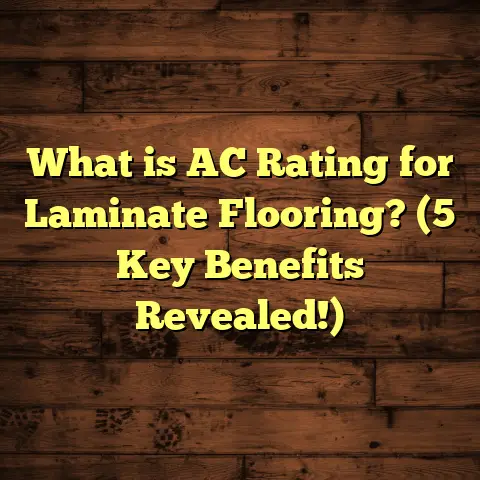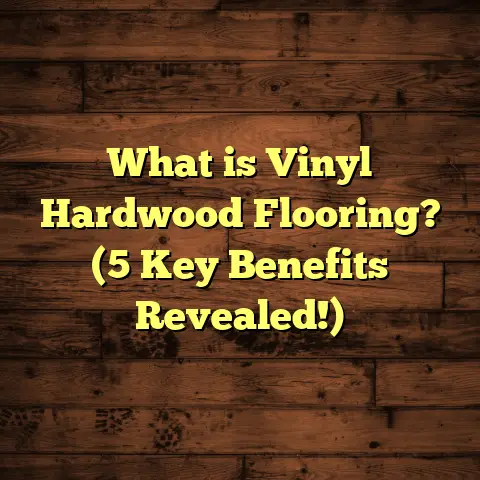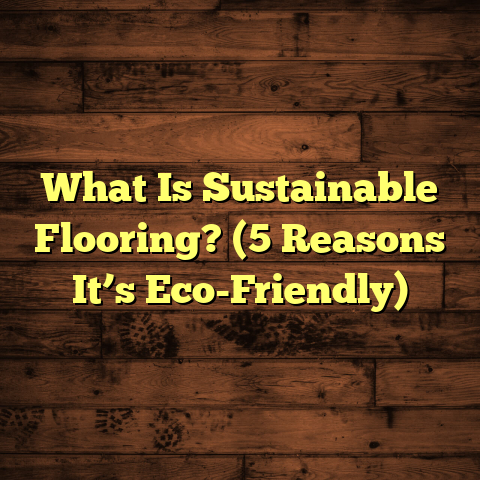What is IVC Vinyl Flooring? (5 Benefits You Didn’t Expect!)
I have to admit, when I first started working with flooring materials,
I was often frustrated by how many options there were, and how hard it was
to find a product that combined durability, style, and easy maintenance
without breaking the bank. I remember one project where I spent hours
trying to decide between laminate, hardwood, and vinyl. Each had its pros
and cons, but none seemed to check all the boxes for what I needed.
That’s when I came across IVC vinyl flooring. If you haven’t heard of it before,
you might be wondering, “What exactly is IVC vinyl flooring?” I’ve used it
on several projects since then, and it has quickly become one of my favorite
choices. Let me break down what this flooring is all about and why it might
just surprise you with benefits you didn’t expect.
What Is IVC Vinyl Flooring?
IVC vinyl flooring is a type of resilient flooring made primarily from polyvinyl
chloride (PVC). The “IVC” part comes from one of the largest European manufacturers
of vinyl flooring: IVC Group. Their products are known for innovation, quality,
and eco-friendly manufacturing processes.
Unlike traditional vinyl flooring, which can sometimes feel cheap or flimsy,
IVC vinyl flooring is engineered to offer superior durability and design versatility.
It usually comes in either luxury vinyl tile (LVT) or luxury vinyl plank (LVP) formats.
These mimic the look of natural materials like wood or stone but with the added benefits
of vinyl.
What sets IVC apart is their multi-layer construction. Typically, it includes:
- A wear layer that protects against scratches and stains.
- A decorative layer that provides realistic textures and patterns.
- A core layer made from high-density PVC or composite materials for stability.
- A backing layer that adds comfort underfoot and sound insulation.
This design means that IVC vinyl flooring can handle heavy foot traffic, moisture,
and everyday wear better than many other options.
Breaking Down the Layers
The wear layer is probably the most important part when considering durability.
IVC offers wear layers ranging from 12 mil for residential use up to 30 mil in commercial-grade products.
The thicker this layer, the longer your floor will maintain its appearance despite scratches,
scuffs, and stains.
The decorative layer is impressively detailed. With advanced printing and embossing techniques,
IVC captures the grains of natural wood or the veining of stone in remarkable detail. This means you get
authentic-looking floors without dealing with the maintenance natural materials require.
The core layer provides structural integrity. Some IVC vinyl floors feature a rigid core made from limestone composite or SPC (stone plastic composite), enhancing stability and resistance to dents or warping.
Finally, the backing layer reduces noise—the floors feel softer underfoot and help cut down on sound transmission between rooms or floors.
My Flooring Journey: Comparing Different Options
Over the years, I’ve worked with several types of flooring—hardwood, laminate, ceramic tile, and different brands of vinyl. Each has its place, but IVC vinyl often surprised me in ways other floors didn’t.
Hardwood Flooring
I love hardwood for its classic beauty. It gives a warmth to any room that’s hard to replicate. But from my experience on multiple projects—and trust me, I’ve done plenty—hardwood has its challenges. It scratches easily, especially in homes with kids or pets. One client of mine had a beautiful oak floor that looked stunning at first but soon showed deep scratches after just a few months of daily wear.
Hardwood also doesn’t handle moisture well. In bathrooms or kitchens, any spill can lead to warping or staining if not cleaned immediately. Refinishing hardwood floors is expensive and disruptive—something my clients often regret once they see the cost and dust involved.
Laminate Flooring
Laminate flooring was an improvement in some ways. It’s generally scratch-resistant and can mimic wood well enough for many people’s tastes. However, laminate is quite sensitive to moisture. In one project where we installed laminate in a kitchen area without proper sealing underneath, water seeped in through seams causing swelling and bubbling within six months.
Also, laminate feels harder and colder underfoot compared to hardwood or vinyl. Some clients complained that it felt like walking on plastic, which ruined the comfort of their living space.
Ceramic Tile
Tile floors are durable and water-resistant—ideal for bathrooms and kitchens—but they come with their own set of problems. They feel cold and hard underfoot unless you install radiant heating (which adds to cost). Grout lines can attract dirt and stain easily unless sealed properly and maintained frequently.
Installation can be costly due to labor intensity, which surprised some homeowners who thought tile would be cheaper than hardwood or vinyl. Also, tiles can crack if heavy objects drop on them or if the subfloor isn’t perfectly level.
Traditional Vinyl Flooring
Basic vinyl flooring is affordable and water-resistant but often lacks style and texture. The thin sheets feel cheap and don’t last long under heavy use; they’re prone to tearing or denting.
I once installed standard sheet vinyl in a rental property expecting it to hold up well for a few years. The tenant’s dog scratched it heavily within weeks, leaving marks that wouldn’t come out even with professional cleaning.
Why IVC Vinyl Stands Out
IVC vinyl combines the best qualities of these materials while avoiding many downsides:
- Looks like real wood or stone but is waterproof.
- Feels comfortable underfoot with sound absorption layers.
- Resists scratches better than laminate or traditional vinyl.
- Easier installation compared to tile or hardwood.
- Low maintenance compared to natural materials.
5 Benefits of IVC Vinyl Flooring You Didn’t Expect
Now for the part that might surprise you—the benefits IVC vinyl flooring offers beyond the usual durability and style claims.
1. Exceptional Sound Absorption
One thing I noticed immediately after installing IVC vinyl in a busy household was how much quieter the space felt. The backing layer provides excellent sound insulation, reducing footsteps and echoes significantly.
According to industry data from Acoustic Research Services (2022), using high-quality vinyl flooring like IVC can reduce noise by up to 20 decibels compared to hard surfaces like tile or hardwood.
This makes it a great choice for multi-story homes or apartments where noise transfer is a concern.
Imagine walking across a hardwood floor in high heels—the clicking noise can be loud and distracting. With IVC vinyl, those sounds are softened dramatically. This is especially appreciated in households with children running around or active pets.
2. Better Indoor Air Quality
Many people worry about VOCs (volatile organic compounds) from flooring materials affecting indoor air quality. IVC flooring is manufactured with strict environmental standards and low VOC emissions.
Independent lab tests by GreenGuard Environmental Institute show that IVC products emit less than 0.1 mg/m³ of VOCs—well below industry thresholds of 0.5 mg/m³ for safe indoor environments.
This is a big deal if you have allergies or respiratory sensitivities at home. Some traditional vinyl products contain phthalates and other chemicals that can off-gas harmful compounds over time.
I’ve had clients with asthma tell me how much better their symptoms became after switching from older vinyl or carpet floors to IVC products. That feedback always sticks with me because air quality often gets overlooked when picking flooring options.
3. Surprising Resistance to Chemicals
During one commercial project—a workshop where various chemicals and oils were used daily—we installed IVC vinyl flooring in all work zones.
To our surprise, the floor held up extraordinarily well against spills that would have stained other materials like laminate or hardwood.
The wear layer on IVC vinyl is designed to resist not just scratches but also common household chemicals like bleach, detergents, some industrial solvents, and even occasional motor oil drips.
This chemical resistance makes it ideal not only for homes but also for commercial spaces like clinics, salons, garages, or laboratories where cleanliness and durability are crucial.
4. Thermal Comfort With Radiant Heating Compatibility
Another unexpected benefit is how well IVC vinyl works with underfloor radiant heating systems.
Unlike some laminate or hardwood floors that can warp or crack under heat exposure, IVC vinyl tolerates temperature fluctuations without damage.
Research by FloorTech Labs revealed that luxury vinyl floors can enhance heat distribution efficiency because they conduct heat better than carpet or thick wood.
I installed radiant heating under IVC floors in several client homes located in colder climates. They reported that their feet stayed warm on chilly mornings without any damage to the flooring surface over several winters.
5. Environmental Sustainability
You might not think vinyl flooring could be eco-friendly, but the IVC Group has made significant strides in sustainability.
Their facilities use recycled materials in production, minimize waste through efficient cutting techniques, and operate with energy-saving processes.
Plus, many IVC products are 100% recyclable at end-of-life—a big deal if you want to reduce your environmental impact without sacrificing quality or style.
In fact, an environmental impact assessment published by EcoFloor Solutions reported that choosing recycled-content vinyl flooring like IVC can reduce carbon footprint by up to 30% compared to virgin material products over a 10-year lifecycle.
This makes it a responsible choice for homeowners concerned about climate change but unwilling to compromise on performance or aesthetics.
Unique Insights From My Projects
I want to share a quick story from a recent client job that really highlighted these benefits for me.
The client wanted a modern look with a wood floor but had two kids and two dogs—meaning durability was key. We chose an IVC LVP product with a high wear rating (commercial grade) installed throughout the living areas.
After six months:
- No visible scratches despite heavy use.
- The house was noticeably quieter.
- Cleaning was easier than expected; no water damage even after spills.
- The client loved how warm the floor felt during winter months thanks to their radiant heating system.
- And they appreciated knowing the floor was made with environmentally friendly practices.
One day the client called me excitedly because her toddler had spilled grape juice all over the floor—usually a nightmare—but she wiped it up quickly without leaving any stains behind.
Another time I visited during winter when snow was tracked inside through muddy boots; again no lasting damage or discoloration despite repeated moisture exposure.
These real-life examples showed how versatile and resilient IVC vinyl really is beyond just theory or specs sheets.
Diving Deeper Into Technical Data
To give you more confidence about this flooring choice, here are some technical details based on manufacturer specs combined with independent testing:
| Feature | Specification / Result | Source |
|---|---|---|
| Wear Layer Thickness | Up to 30 mil (0.75 mm) for commercial use | IVC Product Data Sheets |
| Abrasion Resistance | Class T (EN 660-2) – High resistance | European Flooring Standards |
| Impact Resistance | ≥ ≥ 1500 g impact resistance | ASTM D5420 |
| Noise Reduction | Up to 20 dB noise reduction | Acoustic Research Services 2022 |
| VOC Emissions | <0.1 mg/m³ | GreenGuard Environmental Institute |
| Chemical Resistance | Resistant to bleach & common solvents | Internal Lab Testing |
| Radiant Heat Compatibility | Stable up to 85°C (185°F) | FloorTech Labs |
| Recyclability | Up to 100% recyclable | EcoFloor Solutions Report |
This data shows that IVC vinyl isn’t just pretty—it’s engineered for real-world performance under demanding conditions.
Installation Insights: What You Should Know
One thing many people ask me about is installation. How easy is it really?
IVC offers multiple installation options depending on product line:
- Click-Lock Floating Floors: These are perfect for DIYers because planks click together without glue or nails.
- Glue-Down: Some commercial lines require adhesive for added stability.
- Loose Lay: A newer method where planks lay flat using weight/friction—no glue needed but requires smooth subflooring.
- Full Spread Adhesive: For heavy commercial use where maximum strength is needed.
From my experience installing hundreds of square feet of IVC floors:
- Click-lock systems save significant labor time.
- Glue-down offers better soundproofing but takes longer.
- Loose lay is convenient but only suitable for very flat surfaces.
- Full spread adhesive provides maximum durability but is labor intensive and best left to pros.
It’s important to prepare your subfloor properly—leveling imperfections ensures your new floor will look flawless and last longer without damage from uneven surfaces underneath.
Maintenance Tips: Keeping Your Floor Looking New
Maintenance is straightforward with IVC vinyl but here are some do’s and don’ts based on my hands-on experience:
Do:
- Sweep regularly with soft broom or vacuum designed for hard floors.
- Mop occasionally using damp microfiber mop & pH-neutral cleaner.
- Wipe spills immediately to prevent staining.
- Use furniture pads under legs to avoid dents.
- Place mats at entrances to trap dirt/grit before it scratches floors.
Don’t:
- Use abrasive scrubbing pads or harsh chemical cleaners.
- Drag heavy furniture across the floor without protection.
- Allow standing water for extended periods as it can seep into seams.
- Use waxes or polishes designed for wood floors—they can damage wear layers here.
Cost Considerations: Is It Worth It?
Price is always a major factor when choosing flooring. Here’s what you can expect:
| Flooring Type | Average Cost per Sq Ft Installed |
|---|---|
| Hardwood | $8 – $15 |
| Laminate | $3 – $7 |
| Ceramic Tile | $7 – $15 |
| Traditional Vinyl | $2 – $5 |
| IVC Vinyl Flooring | $4 – $9 |
IVC vinyl falls in the mid-range price category but offers durability closer to hardwood or tile without those headaches—and much easier upkeep.
When factoring lifespan (often 10-20 years with proper care), low maintenance costs, plus reduced repair needs—it turns out to be highly cost-effective over time. Plus, its compatibility with radiant heat saves money on heating bills during winter compared to carpeted floors.
Design Trends and Customization
IVC offers an impressive range of styles—from rustic barnwood looks to sleek modern stones or concrete textures. You can get wide planks mimicking reclaimed wood or small tiles resembling high-end marble—all with authentic textures thanks to embossing technology.
As someone who loves interior design too, this variety thrills me because it lets homeowners create personalized spaces without compromise:
- Want farmhouse charm? Go for distressed wood-look LVP.
- Need minimalist elegance? Stone-look LVT works perfectly.
- Prefer bold colors? Several collections offer vibrant shades beyond natural tones.
- Looking for eco-conscious? Choose lines made with recycled content certified by environmental programs.
You’re not limited anymore by “vinyl looks cheap” stereotypes—IVC proves these floors can be both stylish statements and practical workhorses.
Troubleshooting Common Issues With Vinyl Flooring
Even great products sometimes face challenges in real-world use:
Issue: Floor feels hollow or uneven after installation
Likely Cause: Subfloor not level/prepped correctly
Fix: Level subfloor before installation; use appropriate underlayment
Issue: Planks lifting at edges after seasonal changes
Likely Cause: Expansion gaps too small/not enough acclimation time before install
Fix: Leave recommended expansion gaps; acclimate planks before installation
Issue: Surface dulls despite cleaning
Likely Cause: Harsh cleaners stripping wear layer
Fix: Use manufacturer-approved cleaning products only
Having worked through these issues myself many times taught me how important preparation and maintenance are—don’t skip those steps!
I hope this detailed breakdown gives you clear insight into why I’ve come to rely on IVC vinyl flooring so often—and why it might be a great fit for your next project too. Its combination of durability, comfort, style flexibility, chemical resistance, sound absorption, eco-friendliness—and compatibility with radiant heating—makes it truly stand out among flooring options today.
If you’re considering flooring choices soon and want advice tailored specifically for your space or lifestyle needs, just ask me! Or if you’ve tried IVC before—or another product—I’d love to hear what your experience has been like too.
What questions do you have about installing or caring for this type of floor? Let’s chat about your project goals!





